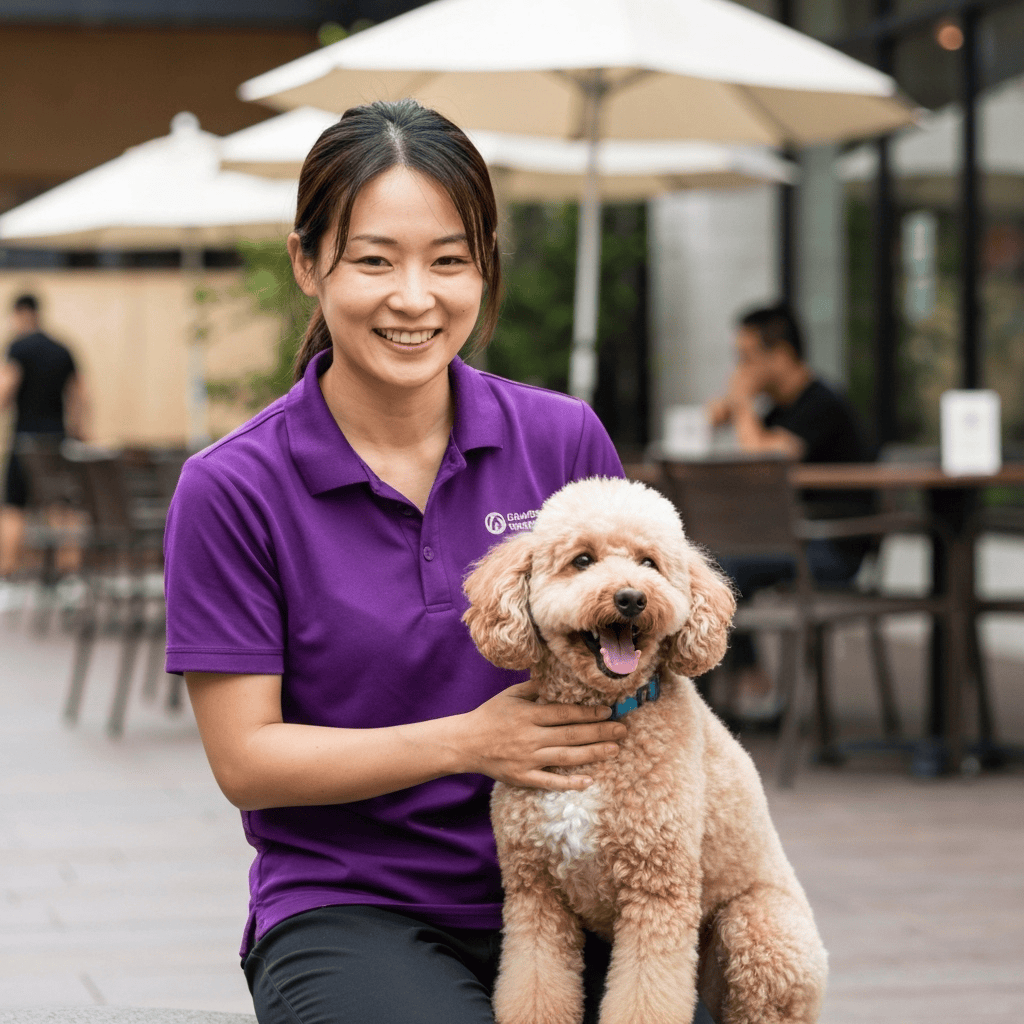Your Complete Guide to Choosing a Dog Trainer in Montgomery
When you live in Montgomery with a dog, you’re dealing with some unique situations. Your pup needs to handle the busy weekends around Lake Conroe, stay calm during the downtown festivals, and walk nicely past all those cyclists on the trails. And let’s be honest – if you want to grab dinner at one of those lake-view patios, your dog better know how to settle quietly under the table.
Finding the right trainer here isn’t just about basic obedience. You need someone who gets what life looks like in Montgomery County and can prepare your dog for the real world you’ll be navigating together.
What Makes a Good Dog Trainer
The best trainers focus on positive reinforcement – they teach your dog by rewarding the good stuff instead of punishing mistakes. This approach works faster and keeps your dog eager to learn, which matters when you’re trying to master loose-leash walking past the weekend crowds at Heritage Park.
Professional credentials give you a quick way to separate serious trainers from hobbyists. Look for certifications like KPA-CTP, CPDT-KA, IAABC-CDBC, or CTC. These show the trainer has studied animal behavior, passed tests, and committed to ethical methods.
Most Montgomery families I know prefer in-home training because that’s where the real challenges happen. Your dog might be perfect in a training facility but still lose their mind when the UPS truck shows up. A good local trainer will work with you on the stuff that actually matters – like teaching your dog not to bolt out the front door when neighbors walk by with their dogs.
Since Texas doesn’t require special licenses for dog trainers, you’ll want to make sure whoever you choose carries liability insurance and runs their business professionally.
Training Methods That Actually Work

The training world is full of confusing terms, but here’s what you really need to know about methods that work well for Montgomery dogs.
Positive reinforcement means your dog gets something good when they do what you want. Treats, praise, toys – whatever motivates your particular dog. This builds confidence and keeps training fun, which is especially important if you have a sensitive breed or a rescue dog who’s still learning to trust.
When your dog is nervous about something – maybe the boat traffic noise from the lake or crowds at the farmers market – good trainers use desensitization and counterconditioning. They gradually expose your dog to the scary thing while pairing it with treats or play, so your dog learns to feel happy instead of worried.
Management is just using smart tools like baby gates, crates, and leashes to prevent problems while you’re still training. If your dog isn’t ready for off-leash freedom in your yard, a long line lets them explore safely while you work on recall.
The best training focuses on life skills rather than just tricks. Your Montgomery dog needs to walk nicely on busy sidewalks, come when called at the dog park, and greet visitors politely. These everyday manners matter more than perfect heel position.
Some trainers offer day training where they work with your dog during the day, then teach you what they’ve practiced. This can speed things up, but make sure they include plenty of coaching for you – your dog needs to listen to you, not just the trainer.
Board and train programs can be intensive and effective, but ask detailed questions. Where will your dog sleep? How many training sessions happen each day? How will they teach you to maintain the training at home? Good programs include follow-up support to help the training stick.
Avoid trainers who rely on fear, pain, or intimidation. These methods might look impressive in the moment, but they often create new problems and can damage your relationship with your dog.
What Training Costs Around Here
Pricing in Montgomery County varies quite a bit depending on the trainer’s experience and what you need. Here’s what you can expect to pay for different services in the Montgomery, Conroe, and Woodlands area.
| Service | Typical Price Range |
|---|---|
| Group classes 4 to 6 weeks | $160 – $300 |
| Private session 60-90 minutes | $110 – $180 |
| Puppy package 4 to 6 lessons | $350 – $650 |
| Day training per week | $500 – $1,000 |
| Board and train 2 to 4 weeks | $1,900 – $4,200 |
| Behavior consult for fear or reactivity | $150 – $250 initial |
Trainers with advanced certifications or those who specialize in behavior problems typically charge more. Don’t forget to ask about travel fees if they’re coming to your home, and make sure you understand their cancellation policy.
The cheapest option isn’t always the best value. A skilled trainer who gets results in fewer sessions often costs less overall than someone who drags things out.
Questions You Should Ask
Before you commit to a trainer, have a real conversation about their approach and experience. Here’s what you need to know:
- What training methods do you use, and how do you keep sessions positive and stress-free for my dog?
- What certifications do you hold, and how do you stay current with new training techniques?
- Based on my dog’s specific issues, what would our training plan look like and how will we track progress?
- Where do you conduct sessions around Montgomery, and how do you gradually add real-world distractions?
- How many sessions will we likely need, and what’s the total investment including any additional fees?
- Do you carry liability insurance and can you provide proof if requested?
- If my dog has behavior issues, do you work with veterinarians when needed?
- What kind of homework will I have between sessions, and what support do you offer when I’m practicing on my own?
Pay attention to how they answer. Good trainers ask questions about your dog, your lifestyle, and your goals before suggesting a program.
Local Resources and Rules
Montgomery sits right in the heart of Montgomery County, with great access to Lake Conroe and plenty of parks where you can practice training. But you need to know the local rules to stay out of trouble.
The City of Montgomery maintains several parks where leashed dogs are welcome. These are perfect for working on loose-leash walking and basic obedience around distractions.
Check out Walden Dog Park on Glenview Drive or Admiral Bark Park on Woodforest Parkway North.
Many Montgomery residents use the dog parks in The Woodlands since they’re so close. The Woodlands Township Parks and Recreation operates several fenced areas including Bear Branch Dog Park, Terramont Dog Park, and Tamarac Park Dog Park. These are great for practicing recall and socializing, but only if your dog is ready for off-leash play.
Conroe offers even more variety with larger parks and different environments. Check City of Conroe Parks & Recreation for current information about their facilities.
If you want to explore nature trails with your dog, Sam Houston National Forest is just north of town and welcomes leashed dogs. Visit U.S. Forest Service – Texas for trail maps and current regulations.
For local pet services, vaccinations, and if you ever need help with a lost dog, the Montgomery County Animal Shelter is your main resource.
Understanding local regulations helps you train responsibly and keeps you welcome in public spaces. Leash laws apply in all city parks and most county areas unless you’re inside a designated dog park. Texas requires current rabies vaccination for all dogs – you can find details at the Texas Department of State Health Services.
Keep in mind that repeated complaints about roaming or excessive barking can lead to citations. A good trainer can help with these issues through management strategies and enrichment activities.
If your trainer wants to hold group classes in public parks, they may need permission from the city or county. Professional trainers usually handle this themselves, but it’s worth asking how they coordinate with local parks departments.

Common Questions
Do dog trainers need a license in Montgomery or Montgomery County?
No, Texas doesn’t require special licenses for dog trainers. They follow regular business regulations like any other service provider. Many serious professionals earn voluntary certifications like CPDT-KA to demonstrate their education and commitment to ethical methods.
Is my dog required to be microchipped in Montgomery?
The city doesn’t require microchipping for all dogs, but it’s strongly recommended and often required if you adopt from shelters. Keep your contact information current in the chip database so the county shelter can reach you quickly if your dog gets lost.
What vaccinations are required for my dog?
Texas law requires current rabies vaccination. Your vet may recommend additional vaccines based on your dog’s lifestyle and local disease risks. Check the Texas Department of State Health Services for official requirements.
Where can I practice off-leash recall?
Only in fenced dog parks. The Woodlands Township operates several good options listed on their Parks and Recreation page. Keep your dog leashed everywhere else – it’s the law and it’s safer for everyone.
Can trainers run classes in local parks?
Yes, but they usually need permission for commercial use. Responsible trainers coordinate with the appropriate department, whether that’s the City of Montgomery or Montgomery County.
What if my dog is fearful or aggressive around strangers?
This requires specialized help from a trainer experienced in behavior modification. Look for credentials like IAABC-CDBC that show expertise in behavior cases. Expect a careful approach using gradual exposure, positive associations, and safety management. Many behavior issues benefit from veterinary consultation too.
How long does training take?
Most families notice improvement within a few sessions if they practice consistently between appointments. Basic manners typically take 4 to 8 weeks to solidify. Complex behavior issues require more time and patience, but you should see gradual progress throughout the process.
The right trainer for your Montgomery dog combines humane methods, relevant experience, clear communication, and understanding of local life. When you’re evaluating options, ask for references, verify insurance coverage, and look for recognized credentials like KPA-CTP or CTC. With good guidance, your dog can become the confident, well-mannered companion you want – whether you’re exploring downtown Montgomery or enjoying a sunset by Lake Conroe.
